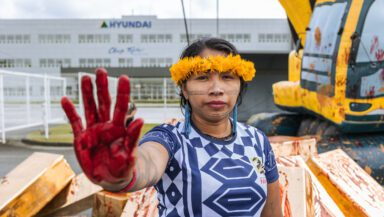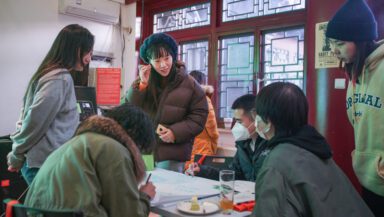Soya in the meat and dairy supply chains of UK supermarkets could be contributing to illegal deforestation in the Amazon, an investigation by Unearthed, the Bureau of Investigative Journalism and Ecostorm has revealed.
The findings undermine claims by some global meatpackers, animal feed companies and supermarkets that soya is no longer linked to Amazon destruction.
In Mato Grosso state, which stretches over the southern part of the Amazon and grows more soya than anywhere else in Brazil, 1,180 sq km of rainforest was felled from 2009 to 2019 on soya farms to grow other crops or to provide pasture for cattle ranching. This is according to data analysed by the Brazilian NGO Instituto Centro de Vida (ICV) and shared with the investigation partners. The vast majority of this deforestation was illegal, lacking licenses under Brazil’s Forest Code.
Soya from the areas most at risk for this type of deforestation is regularly shipped to the UK, Spain and other European countries for use as livestock feed on factory farms by major grain traders including Bunge, which supplies soya to Spain and Cargill, a major UK supplier. Cargill’s customers include Tesco, Asda and Lidl.
The Amazon Soya Moratorium – first agreed in 2006 – bans the sale of soya grown on Amazon land deforested after July 2008. But beef and other crops are not restricted under the soy moratorium, meaning farmers can sell their soya to traders as “deforestation-free” while destroying rainforest for cattle, corn and other commodities.
Studies have shown that the moratorium has successfully stopped rainforest being directly converted into soya fields. However, soya farming has continued to expand in the Amazon, overwhelmingly on land that was previously cleared, usually for cattle. That expansion can still indirectly cause fresh deforestation, as ranchers sell up to farmers at a profit and move deeper into the forest, where land is cheaper.
The investigation established that certain Mato Grosso municipalities appear particularly vulnerable to this hidden deforestation, with trade links leading to Europe and China. The analysis shows a strong flow of soya from these areas to the UK, suggesting a high chance of deforestation in UK supply chains.
In 2020 the UK imported more than 140,000 tonnes of soya from municipalities with at least 7 sq kms of hidden deforestation on soya farms, and about 50,000 tonnes of corn – both crops are used in the meat and dairy supply chains of major food retailers for animal feed.
Paul Morozzo, Senior Forest Campaigner at Greenpeace UK said:“
This is deforestation by the back door. By continuing to sell factory farmed meat and dairy, UK supermarkets are complicit in driving destruction of the Amazon as well as other climate-critical ecosystems across Brazil.
“Supermarkets cannot ignore the role of meat and dairy in the climate crisis. It’s time they took real action to end links to deforestation for good. That means dropping forest destroyers and reducing meat and dairy. Until they do, they may as well be handing out matches to light this years’ Amazon fires.”
Ana Paula Valdiones, coordinator and author of Instituto Centro de Vida’s report said:
“Mato Grosso needs a more comprehensive agreement, one which monitors entire farms, includes other grain crops and increases the transparency of audit processes and results.”
ENDS
Notes to editors
Read the full investigation which includes links to the Instituto Centro de Vida’s data analysis along with other references on the Unearthed website here:
https://unearthed.greenpeace.org/2022/02/10/deforestation-free-soya-farmers-amazon-destruction/
and on The Bureau of Investigative Journalism website here: https://www.thebureauinvestigates.com/stories/2022-02-10/farms-touting-deforestation-free-soya-still-tearing-down-the-amazon



